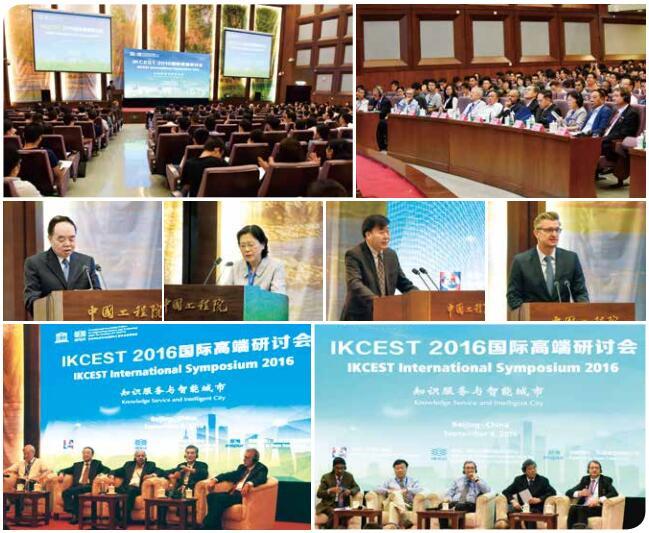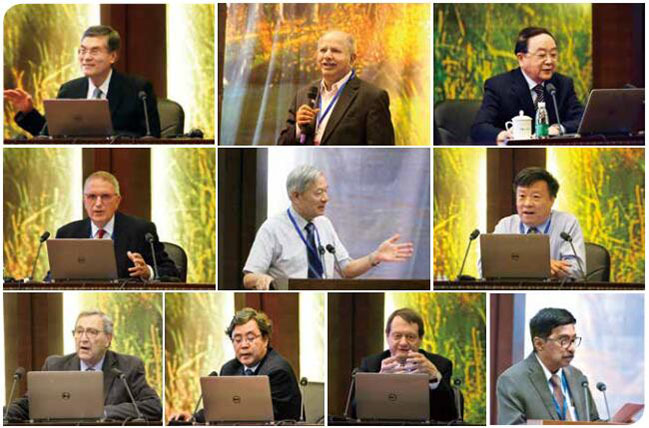The IKCEST International Symposium 2016 was held in the headquarters of the Chinese Academy of Engineering (shortened as “CAE”) in Beijing on September 4, 2016. Themed on “Knowledge Service and Intelligent City”, the symposium was hosted by CAE and organized by the International Knowledge Centre for Engineering Sciences and Technology under the auspices of UNESCO (shortened as “IKCEST”). More than 400 representatives attended the symposium, including over 20 renowned foreign and domestic academicians and experts.
The International Knowledge Centre for Engineering Sciences and Technology is a category 2 centre under the auspices of the UNESCO. IKCEST was established on June 2, 2014. The Chinese Academy of Engineering is responsible for the operation and management of the IKCEST. Under the auspices of UNESCO, IKCEST is a comprehensive and international knowledge centre devoted to the engineering sciences, technology and applied technology. IKECST aims at connecting engineering sciences and technology institutions globally, assembling various digital resources relating to engineering sciences and technology, building up a public data service platform and corresponding service environment, and coordinating the building of various professional knowledge systems, thus providing knowledge-based services at a global scale in the form of consultancies, scientific research and education for policy-makers and engineering science and technology professionals in the world, with particular reference to the developing countries.
Zhou Ji, President of CAE, Chen Zuoning, Vice President of CAE, Zhou Jiagui, Deputy Secretary-General of the Chinese National Commission for UNESCO and Hans Thulstrup, Program Specialist of UNESCO Beijing Office addressed the symposium. President Zhou Ji mentioned that the Chinese Academy of Engineering was very willing to carry out active and in-depth cooperation with UNESCO and international engineering science and technology institutions in intelligent transportation, modern logistics and Internet of things, thus jointly promoting the prosperity and development of the world’s engineering science and technology sector.
Centered on “Knowledge Service and Intelligent City,” the symposium was divided into two sessions. The morning session was moderated by Prof. Wu Cheng, CAE Member, with four speakers giving keynote speeches respectively. Prof. Pan Yunhe, CAE Member, analyzed profoundly the development models of intelligent city in China. From global interest in smart cities to various perspectives of the development of intelligent city in China, the report showed much concern and expectation to the development of Chinese intelligent cities. Prof. Raj Reddy, CAE Foreign Member, also Turing Award Winner, talked about the role of smart villages in the 21st century and the problems and difficulties that might occur during the development. Introduction to the infrastructure and services needed from a smart village perspective was also given. Prof. Li Bohu, CAE Member, unscrambled the connotation of smart city and proposed the system architecture and the body of technology for big data platform in smart city. Some proposals to develop the studies and practices on big data in smart city were further suggested. Prof. Bernhard Mueller from German Academy of Science and Engineering (acatech) believed that the eco-city and the intelligent city were two closely related concepts. With great insight, the report provided some thoughts into the question how “intelligence” and knowledge systems contribute to shaping modern eco-cities, and thus may foster environmentally sustainable and resilient urban development.
The afternoon session was moderated by Prof. Narayanaswamy Balakrishnan, Fellow of Indian Institute of Science. Prof. Gao Wen, CAE Member, proposed that mobile devices showed great potential for visual search and put forward a collaborative platform to evaluate the state-of-the-art visual search techniques and solutions. Gary Hack, Professor Emeritus of University of Pennsylvania and MIT, believed that dramatic changes to city form would have an impact on how intelligence would be added to cities and explained the possible form of cities over the next two decades as a basis for deciding how to construct the smart city. Prof. Wu Zhiqiang, Vice President of Tongji University, emphasized the importance of building a mutual knowledge sharing platform to promote intelligent city development and proposed a platform designed to provide the public, scholars and experts with knowledge in three dimensions. Prof. Otthein Herzog, Member of German Academy of Science and Engineering (acatech), pointed out that the first step to “Intelligent Cities” were “Integrated Cities” where a reliable control was available for the information to flow across system boundaries. Rules could be extracted from integrated data through Data Mining and Knowledge Discovery technologies which in turn could serve as a basis for a set of models which allow for a “digital representation” of the complex processes within cities.
An atmosphere of warm friendship prevailed at the two panel discussion sessions, with speakers answering questions raised by the audience, and in-depth interactive communication carried out. The symposium came to an end with Vice President of CAE Chen Zuoning giving the closing speech.
The symposium provided a platform for top scientists and engineers, scholars and experts all over the world to share research progress and insights, making significant contribution to facilitate the world’s engineering science and technology community to carry out active and close cooperation in intelligent city development, technology research on big data and knowledge service, etc. in the future.


Original Text (This is the original text for your reference.)
The IKCEST International Symposium 2016 was held in the headquarters of the Chinese Academy of Engineering (shortened as “CAE”) in Beijing on September 4, 2016. Themed on “Knowledge Service and Intelligent City”, the symposium was hosted by CAE and organized by the International Knowledge Centre for Engineering Sciences and Technology under the auspices of UNESCO (shortened as “IKCEST”). More than 400 representatives attended the symposium, including over 20 renowned foreign and domestic academicians and experts.
The International Knowledge Centre for Engineering Sciences and Technology is a category 2 centre under the auspices of the UNESCO. IKCEST was established on June 2, 2014. The Chinese Academy of Engineering is responsible for the operation and management of the IKCEST. Under the auspices of UNESCO, IKCEST is a comprehensive and international knowledge centre devoted to the engineering sciences, technology and applied technology. IKECST aims at connecting engineering sciences and technology institutions globally, assembling various digital resources relating to engineering sciences and technology, building up a public data service platform and corresponding service environment, and coordinating the building of various professional knowledge systems, thus providing knowledge-based services at a global scale in the form of consultancies, scientific research and education for policy-makers and engineering science and technology professionals in the world, with particular reference to the developing countries.
Zhou Ji, President of CAE, Chen Zuoning, Vice President of CAE, Zhou Jiagui, Deputy Secretary-General of the Chinese National Commission for UNESCO and Hans Thulstrup, Program Specialist of UNESCO Beijing Office addressed the symposium. President Zhou Ji mentioned that the Chinese Academy of Engineering was very willing to carry out active and in-depth cooperation with UNESCO and international engineering science and technology institutions in intelligent transportation, modern logistics and Internet of things, thus jointly promoting the prosperity and development of the world’s engineering science and technology sector.
Centered on “Knowledge Service and Intelligent City,” the symposium was divided into two sessions. The morning session was moderated by Prof. Wu Cheng, CAE Member, with four speakers giving keynote speeches respectively. Prof. Pan Yunhe, CAE Member, analyzed profoundly the development models of intelligent city in China. From global interest in smart cities to various perspectives of the development of intelligent city in China, the report showed much concern and expectation to the development of Chinese intelligent cities. Prof. Raj Reddy, CAE Foreign Member, also Turing Award Winner, talked about the role of smart villages in the 21st century and the problems and difficulties that might occur during the development. Introduction to the infrastructure and services needed from a smart village perspective was also given. Prof. Li Bohu, CAE Member, unscrambled the connotation of smart city and proposed the system architecture and the body of technology for big data platform in smart city. Some proposals to develop the studies and practices on big data in smart city were further suggested. Prof. Bernhard Mueller from German Academy of Science and Engineering (acatech) believed that the eco-city and the intelligent city were two closely related concepts. With great insight, the report provided some thoughts into the question how “intelligence” and knowledge systems contribute to shaping modern eco-cities, and thus may foster environmentally sustainable and resilient urban development.
The afternoon session was moderated by Prof. Narayanaswamy Balakrishnan, Fellow of Indian Institute of Science. Prof. Gao Wen, CAE Member, proposed that mobile devices showed great potential for visual search and put forward a collaborative platform to evaluate the state-of-the-art visual search techniques and solutions. Gary Hack, Professor Emeritus of University of Pennsylvania and MIT, believed that dramatic changes to city form would have an impact on how intelligence would be added to cities and explained the possible form of cities over the next two decades as a basis for deciding how to construct the smart city. Prof. Wu Zhiqiang, Vice President of Tongji University, emphasized the importance of building a mutual knowledge sharing platform to promote intelligent city development and proposed a platform designed to provide the public, scholars and experts with knowledge in three dimensions. Prof. Otthein Herzog, Member of German Academy of Science and Engineering (acatech), pointed out that the first step to “Intelligent Cities” were “Integrated Cities” where a reliable control was available for the information to flow across system boundaries. Rules could be extracted from integrated data through Data Mining and Knowledge Discovery technologies which in turn could serve as a basis for a set of models which allow for a “digital representation” of the complex processes within cities.
An atmosphere of warm friendship prevailed at the two panel discussion sessions, with speakers answering questions raised by the audience, and in-depth interactive communication carried out. The symposium came to an end with Vice President of CAE Chen Zuoning giving the closing speech.
The symposium provided a platform for top scientists and engineers, scholars and experts all over the world to share research progress and insights, making significant contribution to facilitate the world’s engineering science and technology community to carry out active and close cooperation in intelligent city development, technology research on big data and knowledge service, etc. in the future.












 User Center
User Center My Training Class
My Training Class Feedback
Feedback












Comments
Something to say?
Login or Sign up for free